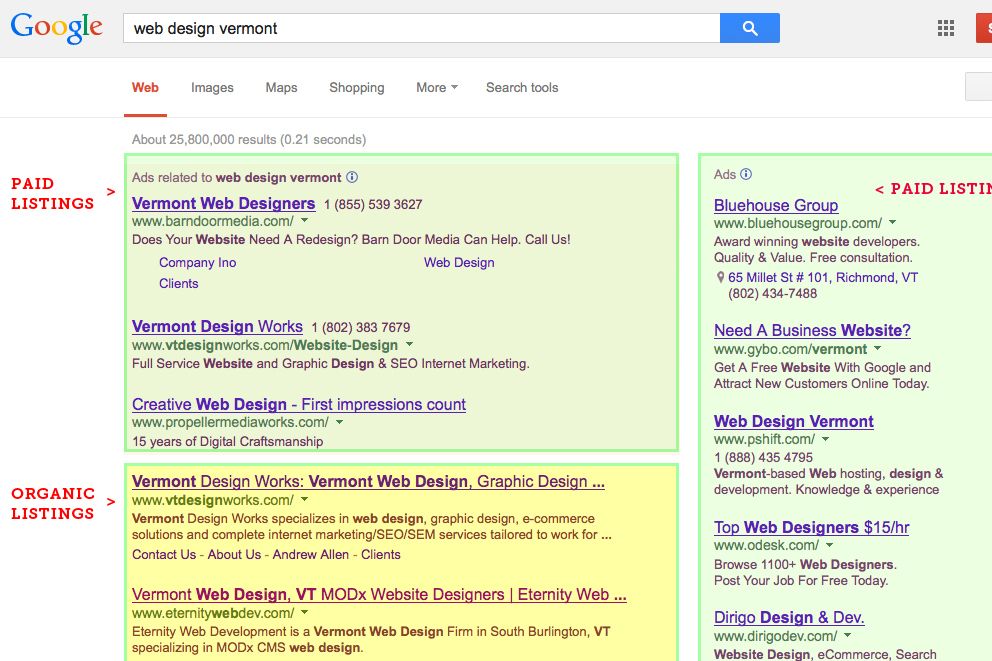Many business owners, executives, and small-business professionals don't understand the difference between paid search and "organic" search, and as the Internet becomes the primary marketing vehicle for nearly every business -- large or small, national or local -- understanding the difference will be critical to business success. The "difference" is in more than the type of online marketing businesses will need to perform; the two different types of search will also differ in their reach, their effectiveness, and how they are measured.
Paid Vs. Organic Content Marketing
The difference in the two types of content marketing is easy to describe. In short, paid search results are ones for which you will pay money (typically in return for clicks -- hence the term "pay per click"). Paid search, in other words, is a form of advertising. "Organic" results are free results displayed by search engines based. Both are based on how well a search phrase entered by a user matches the content on your site.
On Google, paid listings are shown in a shaded area at the top of the page (usually up to 3 ads) and in small text ads on the right-hand side of the results page. Other search engines follow suit with similar formatting. Usually paid results are visible above or in addition to organic results, and are often shaded with background color, outlines, or other visual identifiers.
Organic listings are free of cost, and sites that have been properly coded by a web developer and tagged by an SEO professional can perform quite well in organic search. It takes work to stay on top of organic listings for important keywords -- especially competitive keywords (like keywords for a highly-competitive industry like web design in a small market like Burlington, Vermont). Your success in organic search is completely dependent upon your staying on top of "on page" content on your site, including Meta titles, descriptions, headlines, and other basic elements, as well as the timeliness and relevancy of your blog -- which is a MUST to boost and maintain organic search rankings. It can be easy to drop to page 3 (or rise to page 1), depending on your attention to detail and willingness to continually update the site (or partner with an agency who will help).
REACH
Paid search represents about one-third of all clicked results on the Internet (MarketingProfs.com - "Paid Search vs. Organic Search: Which Converts Better?", September 4, 2013). That means that 1 of every 3 search results clicked is a paid placement. Certainly, this shows that strictly based on the potential reach of your search term, you can potentially appeal to double the audience than with a paid result. But that does not take into account the competitive landscape (as in how many other sites are trying to attract the same users), or the cost of NOT appearing in the first page of results on Google.
And remember, there is a cost in "organic" SEO -- someone has to do the work, and it can be detailed, time-consuming, and, well, not fun.
Paid search can essentially guarantee (for a price, of course) page 1 placement. Many businesses balk at having to pay for that which can come to them for free, but it's important to remember that those costs can be easily managed. You can typically decide how much you're willing to spend, tweak your campaigns based on success levels and return on investment, and budget for a consistent flow of traffic to augment the slow times (or cut back during busy times). In short, the financial aspect is 100% in your hands.
Paid search is great for seasonal business, and certainly for retail businesses, where shopping ads have been shown to be more effective in converting visitors to customers than organics. And because you have complete control over your messaging, you know what text and images drove users to your site, so you can rely on those tactics again
EFFECTIVENESS & ROI
Paid advertising is shown to have a higher conversion rate than organic search results. In other words, users who come to a website form a paid ad are more likely to make a purchase than those coming from organic ads. And because Google tracks the effectiveness of both organic and paid clicks, you will always know exactly how much you spent to gain that sale. Certainly, you can track the conversion rate of organic clicks, but you it will be much more difficult to determine the exact cost of that conversion, since organic content activities are nearly impossible to quantify on an individual campaign or product basis.
Most experts agree that you need both organic and paid SEO tactics in your search marketing strategy. The more established your business, the more unique, and the more relevant to a local area, the more likely you can rely on organic clicks. The more product-oriented, national, or new your business is, the more you'll likely need paid search marketing to boost your relevancy on particular keywords. The ideal mix will be one that changes frequently, but one from which you will gain great ROI as you focus paid efforts on areas you've targeted for growth while continually paying attention to organic content to boost your overall competitiveness and eventual ownership of your keywords.

